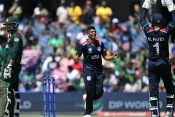Pakistan square series with famous ten-wicket victory
A typically erratic burst of brilliance from Wahab Riaz cracked England's resistance on the fourth afternoon at the Kia Oval, as Pakistan finished their Test series in the same magnificent style with which they had begun it at Lord's last month, by swarming to a famous series-levelling victory in the fourth and final Test against England.

A typically erratic burst of brilliance from Wahab Riaz cracked England's resistance on the fourth afternoon at the Kia Oval, as Pakistan finished their Test series in the same magnificent style with which they had begun it at Lord's last month, by swarming to a famous series-levelling victory in the fourth and final Test against England.
Set 40 for victory after overcoming some stiff but ultimately futile resistance from England's lower-middle order, Pakistan had recouped 16 of those before tea, before romping to a ten-wicket victory in the space of 20 minutes after the resumption, thanks to the efforts of Sami Aslam and Azhar Ali, to whom the honour of the winning hit, high into the pavilion, eventually fell.
England had resumed the contest with four wickets already squandered, and a stiff deficit of 126 runs still to be overcome, but they summoned the last vestiges of their intent and determination, largely thanks to Jonny Bairstow's 81 from 127 balls, to stave off an innings defeat and extend the contest into the day's final session.
However, after Pakistan had chiselled out two vital wickets in a nervy morning's work, the return of Wahab's fierce pace in the first hour after lunch was the moment at which all hope for England was blown away.
Wahab's impact in his first spell had been tempered by the attentions of umpire Bruce Oxenford, who handed him his second warning for following through on the pitch. Given how futile his efforts have been to combat a series-long no-ball problem, Wahab's expulsion from the attack was only ever a matter of time. And sure enough, his day's work was brought to a premature end two balls into his 12th over when Oxenford handed him his third and final strike.
By then, however, the only two balls of his spell that really mattered had already come and gone. Charging in for his first over of the afternoon session with the sort of startling impact that only bowlers of genuine pace can create, Wahab got rid of each of England's last two recognised batsmen, Bairstow and Chris Woakes, in consecutive deliveries to reduce England to 209 for 8.
The timing of his intervention was as shattering as the spell itself, coming as it did with England a mere five runs shy of parity, and with two in-form men at the crease who might well have backed themselves to eke out the sort of three-figured lead that could have put their opponents under pressure in the fourth innings. Instead, in the blink of an eye, England's only remaining ambition was to avoid an innings defeat, which they duly managed to ironic cheers when Finn clipped Wahab through midwicket three overs later.
The first of the big two to fall was Woakes for 4, sold a dummy at the non-striker's end as Bairstow hopped on to the back foot to nudge a Wahab lifter for a single into the leg side, only for the bowler himself to gallop across in his follow-through, pounce on the ball and shy from five yards while still on his knees. Woakes was nowhere near getting back.
One delivery later, and clearly rattled by his own misjudgement, Bairstow attempted to reassert his authority but chose the wrong ball against which to do so. More heat outside off stump from Wahab meant that Bairstow was never in position for his drive, and Azhar at short cover completed a sharp low chance to send his team-mates into ecstasy.
It was hard luck on Bairstow, who up to that point had scarcely blinked in his bid to haul England back off the canvas in this contest, and in the course of his innings, he became only the second player, after VVS Laxman in 2002, to score 900-plus runs in a year batting at No. 6 or lower.
After taking a handful of overs to find his range, Bairstow laid into Pakistan's left-armers with three rifled drives for four off Amir and Wahab, as Misbah's natural reticence - even at moments of clear dominance - translated into a slightly tentative opening gambit from his team.
It was the less-heralded wiles of Sohail Khan that finally prised the opening, as Gary Ballance - who had also been lining up the left-armers with confidence as they angled the ball back into his pads - found the right-armer's seam and swing less easy to comprehend.
Sohail's fourth delivery of the morning was a triumph of line and length, as he pitched the ball on the left-hander's off stump, found a modicum of movement off the seam and some steepling extra bounce to take the edge and climb through to Sarfraz Ahmed.
Moeen Ali, coming off the back of a brilliant first-innings hundred, immediately got off the mark with a flicked four off the pads and he too resolved to remain as fluent as possible as England sought to chip away at their deficit.
For the best part of an hour, Moeen and Bairstow blotted out the match situation in a brisk 65-run stand for the sixth wicket, as England revived some timely memories of the match-turning alliance that the same pair had produced from a similarly dicey position in the third Test at Edgbaston.
Yasir Shah, whose confidence appeared to have been restored by his three-wicket burst on the third evening, struggled at first for the same impact and Moeen cashed in with a yawning straight six over long-on.
But, with five minutes to go until lunch, and having begun to find a decent rhythm from around the wicket as he targeted the rough outside the left-hander's off stump, Yasir claimed the big breakthrough with the one that went straight on. Anticipating the spin, Moeen was instead suckered by extra bounce, and Sarfraz behind the stumps took a sharp edge with a hint of a juggle.
It was the prompter that Yasir needed to get back onto the offensive, and soon after Wahab's twin interventions, Pakistan's legspinner completed his series as he had begun it so memorably at Lord's, wrapping up his sixth five-wicket haul in 16 Tests when Stuart Broad sent an attempted reverse sweep to Younis Khan at slip.
It meant that Yasir finished the series with 19 wickets at 40.73 - but 15 at 18.13 in his two Tests in London. He now has a grand total of 95 wickets in 16 Tests, and had it not been for his anonymous showings in Pakistan's two mid-series defeats at Old Trafford and Edgbaston, he would surely have raced past George Lohmann's 120-year old record and become the fastest bowler to reach 100 wickets in Tests.
Yasir could not apply the coup de grace to England's innings. That honour instead went to the debutant Iktikhar Ahmed, who brought an end to some spirited defiance from England's final pair, and picked up his maiden Test wicket, when he extracted an lbw verdict against James Anderson for 17.
With nothing less than a miracle required to salvage the contest, Alastair Cook threw the ball to his likeliest wicket-takers, Woakes and Steven Finn, only for the latter to limp out of the attack after two deliveries after picking up a hamstring strain. It was an apt finale to a series in which each of England's forward strides seemed to have been matched by an equal leap in the opposite direction.
For Pakistan, however, the glory was absolute - sealed by Azhar with a mighty six into the top tier of the pavilion off Moeen, and on their nation's Independence Day holiday to boot.
As the players posed on the outfield with a large Pakistani flag before embarking on a lap of honour, they could reflect on a stunning series draw that not only denied England their stated goal of holding all the series trophies against all nine of their Test opponents, but reaffirmed their own prospects of achieving the unthinkable and rising to become the No.1 nation in the world. For a side that has not played a single match on home soil in more than seven years, that would be a glory without parallel.
(Source: Cricinfo)
(Source: Cricinfo)











_mq.jpg)